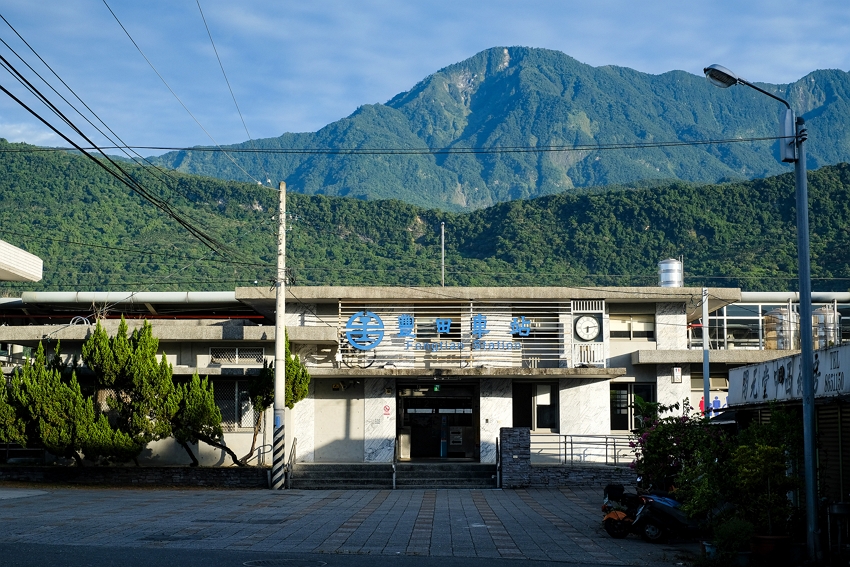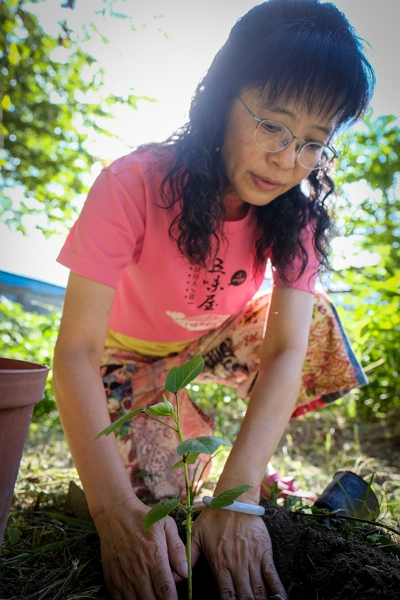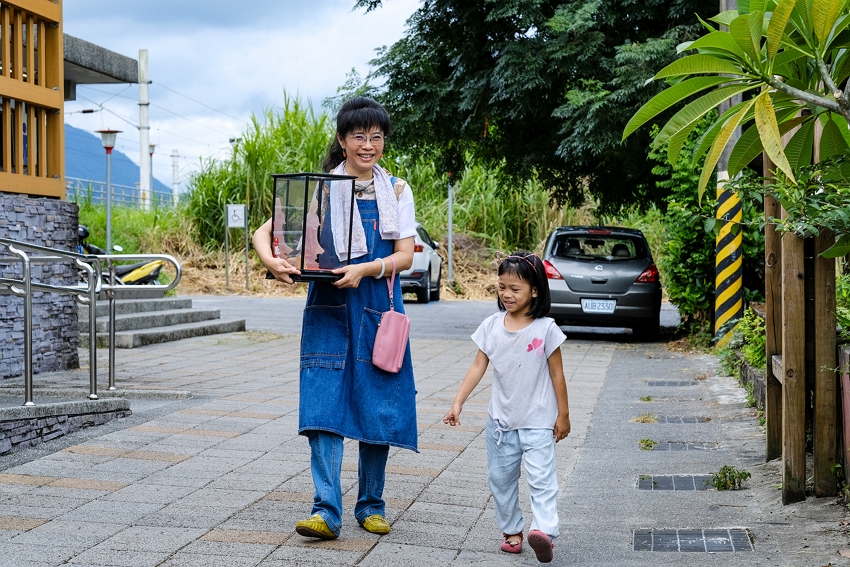New Southbound Policy Portal

The support, understanding, and companionship provided by 5-Way House become sources of strength that stay with the children as they grow up. (photo by Chuang Kung-ju)
In the month of August, children are planting out young roselle bushes outside 5-Way House in Hualien’s Fengtian Village. Seeds were sown back in March, but nothing stirred, and the soil was reused for growing tree seedlings. But a few months later, to everyone’s surprise, roselle plants sprang up in the seedling pots. Roselles just need a little care when they are seedlings, and they will grow big and strong on their own, so they are especially suited to natural farming methods. This is like the concept behind 5-Way House, where rural children are given support and guidance from a young age; this can serve as a source of strength when the children face difficult situations, so that they can grow up to live beautiful, fruitful lives.
Around 9 a.m. on weekends, children come to 5-Way House to prepare this charity second-hand shop for the day’s business. In the work area, adults or older children guide young children in arranging goods. Each donated item is a new discovery: “What’s this? Where did it come from? Why didn’t its owner want to keep it? How much should we ask for it? If it’s too expensive, it won’t sell; if it’s too cheap, we’ll feel taken advantage of….”
In the process, children learn to read and to express themselves, and to distinguish between “needing something” and “wanting something.” When customers ask prices, haggle, or just drop by for a visit, children can learn how to engage with them. Children learning through life experiences, in a space filled with the sounds of their laughter and play: this is the daily norm at 5-Way House.

The three villages of Fengshan, Fengli, and Fengping in Hualien’s Shoufeng Township were together formerly known as Fengtian (“Toyoda” in Japanese). It was a community for migrants from Japan during the era of Japanese rule, and even today it still retains the checkerboard street pattern and rich cultural ambience of those times.
Located beside Fengtian Train Station in Hualien County’s Shoufeng Township, 5-Way House is an old building left behind from the era of Japanese rule, with a hipped roof, sloped on all four sides, that is lined with sugarcane leaves. Ten or so years ago, it was slated to be demolished, but in the end was preserved because it is full of historical memories for local residents.
The residents sought out Ku Yu-chun, a professor at National Dong Hwa University who has long been involved in community development in Hualien, to lead the way in renovating the space. Ku arrived in Hualien in 1995 to become director of the Center for Teacher Education at Dong Hwa, where she tried to transform rural communities through education infused with a sense of place.
However, after more than a decade of training class after class of teachers who were full of enthusiasm for rural education, Ku realized that the mainstream values of the countryside had not changed: One could only succeed by going to the city, and if your grades were poor then all you could do was stay in the countryside and work on the farm. Thus young people were anxious to leave rural areas, and only those with no choice stayed behind. Ku felt that the prevalence of these values in education created an impenetrable wall. But perhaps this old building could be transformed into a base for putting her educational ideals into practice and improving conditions for disadvantaged people. So she brought together a group of adults and children to operate a charity second-hand shop, which she called “Wu Wei Wu” (literally “Five Flavor House,” but translated as 5-Way House) because this was not a place for making profits, but a space where people could build relationships with one another and where all the flavors of life could be tasted.

Fengtian Train Station in the early morning: The sun is rising on a tranquil scene, ringed by mountains.
For Ku Yu-chun to transform 5-Way House into a venue for diverse learning for rural children, a lot of work needed to be done. Adults and children worked together to repair the walls; there were no display shelves, so they had to make do with cardboard boxes; and they reassembled salvageable parts of discarded furniture to make three good tables out of five broken ones.
Children who work at 5-Way House can earn points that they can exchange for daily necessities or opportunities to take part in activities. For instance, several children wanted to learn to play the guitar, so 5-Way House found a student at Dong Hwa University to come out and teach them, and the children could exchange points for guitar class time. 5-Way House and the children work together to find practicable ways to build kids’ ability and courage to pursue their dreams, and not merely wait around for assistance because they were raised in a poor, remote area.
Last year Ku won a “Global Highlights for the Future” educational fellowship from the Sayling Wen Cultural and Educational Foundation, and this September she will go to Australia to tell the 5-Way House story. Ku has turned the fellowship into a study activity for the children, giving them the chance to go with her and speak about 5-Way House themselves. Those who wish to take part must first put in a written plan, then give an onstage presentation. Kids jokingly compare Ku Yu-chun with a demon guarding a gate—you can only go to Australia if you pass her tests.

5-Way House is always filled with the sounds of laughter and play. Visitors feel its energy as soon as they enter.
Many of the kids who come to 5-Way House are from broken homes, and have to move around between relatives’ families; or their parents have no regular work or income…. These issues manifest themselves in various ways: children may be poorly motivated to study, or emotionally unstable. Ku uses the metaphor of an exhibition curator to describe her relationship with them: “Each child is like a work of art, and based on the given child’s form and nature we try to enable them to be recognized anew, understood, and appreciated. We are not ‘repairing’ them, nor are we ‘molding’ them into something more attractive.”
For example, many people ask Ku how to stop a child from stealing. She says: “It’s not only children who steal. 5-Way House also has customers who come specifically to steal things.” First, she sets aside the idea of “correcting” the child’s stealing. “Each time an incident of theft occurs involving the child, we will discuss with them their connection with stealing, and from there we can better understand and know the child. We turn the theft into a life experience that can feed back into the child’s maturation process. After that we continue to stay with the child as they grow older and then one day, their ideas straighten out and they no longer steal.”

Ku Yu-chun uses natural farming methods to care for both roselle plants and children. She carefully prepares the environment to enable both to grow up to express their own individual natures.
At 5-Way House, it is not only children who learn, but adults and children who learn together. Even if parents are objectively poor role models, children, given the chance, will still choose to stay with their parents. “Through their behavior, children continually express the idea that ‘no matter what the teacher thinks of my parents, I will always love them.’ If others can’t show respect to a child’s parents, it will prevent them from playing a positive role in the child’s life as the child grows up. And this will leave a permanent hole in the hearts of these children,” says Ku Yu-chun.
As a result, Ku abandoned her fixation on the notion that parents had to become responsible adults, and started afresh to build new relationships with these parents who don’t live up to society’s expectations.

5-Way House allows children to learn through the detail involved in each and every task. After countless practice sessions, the children confidently go out to surrounding shops to promote a new 5-Way House activity.
5-Way House has even worked to create local job opportunities, so that parents who would otherwise be forced to seek work elsewhere can remain with their families, and the child can live with both parents.
Take for example “Food Stand,” located just across from 5-Way House. The space exclusively sells snacks handmade by mothers in the community. Looking at a woman named Xiufeng who is making scallion pancakes with an experienced hand, occasionally shyly chatting with customers, and robustly recommending roselle popsicles she has made herself, it’s hard to imagine that when she first came to 5-Way House many years ago, she was utterly lacking in self-confidence and often unable to face others when she had physical or mental problems.

The support, understanding, and companionship provided by 5-Way House become sources of strength that stay with the children as they grow up.
Over the past ten years, 5-Way House has not only thrived and put its second-hand shop on a sound footing, it has also given rise to several related “offshoot” enterprises. Besides Feng Yi Shi (a second-hand clothes shop) and Food Stand across the street, behind 5-Way House there is the Jian Xing Workshop, a 400-square-meter space where children can do woodworking, and where special sales events are held. Distributed throughout the community are other venues, including a roselle garden, the Dream House (where children can gather in the evenings to cook food and do homework), a second-hand bookshop called 5-Way Bookstore, and two homestays run for charity: Grandma’s House and Feng Tian Hostel.
These places are described as offshoots of 5-Way House because they were not part of the original plan for the shop. Local residents have given their support, offering idle spaces for 5-Way House to use, without even charging rent. Adults and children from 5-Way House discuss the use of spaces together. When volunteers needed a place to stay, a space was turned into a homestay. When it turned out that the lender of a house loved books, they opened a bookstore there. Commercial considerations did not come into play, so they could simply make an inventory of needs and resources. The children could exercise their creativity in decorating these places, and so every space shows traces of children learning by doing.
This August, 5-Way House opened a new venue: a community movie theater set up in an unused sheet metal structure, which the children have dubbed “The Place Where You Really Want to Stay Awhile.” When we visited Fengtian, we saw the children spreading the word in the community about the opening ceremony for the theater. We witnessed older children leading younger children by the hand into nearby shops, where owners would put aside their work and listen earnestly to what the children had to say. They did not get impatient if the children could not express themselves clearly, but rather continually offered them encouragement, showing great kindness and warmth.

Before 5-Way House closes each day, the children gather in one place and write down what they have learned from work that day, while adults write down their observations of and praise for the kids.
The new community theater was finally opening after months of renovation and clean-up work by the children. 5-Way House hopes this will be a space that is shared with the community. Movies can be shown here as part of senior education for community elders, and perhaps Southeast-Asian students from National Dong Hwa University can be invited to choose films for migrant workers and immigrants, bringing in all kinds of Southeast-Asian friends to watch together. Ideas like these are continually popping up at 5-Way House, with it left to emerge naturally over time which are feasible and which are not.
From the first group of children who grew up with 5-Way House, some have by now returned home to Fengtian to take part in community development work. There are also young people studying social work or related subjects at university elsewhere who return to 5-Way House during summer and winter vacations to look after the younger children.
Each day at 5-Way House is flexible, and can be adjusted in line with the children’s needs as they grow up and become stronger and sturdier. It’s a lot like the way Ku Yu-chun uses natural farming methods to care for roselle plants: “Right now it’s as if we’ve laid the foundations and prepared the soil, and are seeing what we can cultivate, so that each according to their individual natures, the children can grow up in different and interesting ways.”